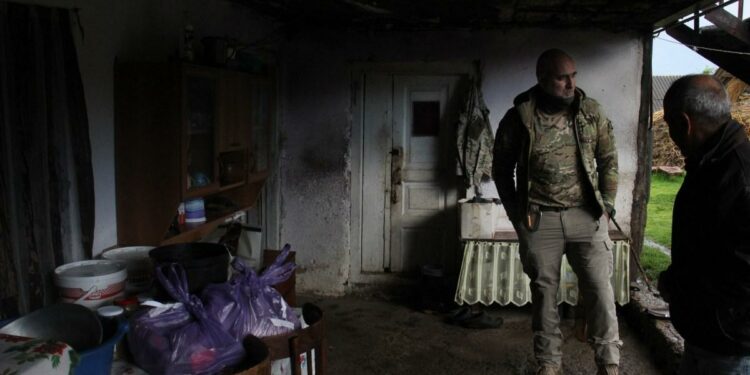To view this video please enable JavaScript, and consider upgrading to a web
browser that
supports HTML5
video
‘Gamarjoba, gamarjoba,’ Katsarava greets a woman in Georgian as he pulls out plastic bags filled with beans, rice, flour, and other non-perishables from the boot of his car.
Entering her courtyard, there are two buildings – a bungalow with a porch, where red peppers are left to dry on strings, and the skeletal remnants of a two-storey house against an empty sky.
Only the bases of the walls still stand, with crumbling stones and twisted metal rods poking from what were once the frames of windows.
‘Be careful, it is not stable,’ Katsarava warns us.
The structure sits on the edge of unresolved struggle. It is where the woman lived with her husband before Russian soldiers set fire to their home and abducted him 14 years ago.
Kvinkadze was forced to leave his home in Abkhazia more than 30 years ago (Picture: Marium Urushadze)
After spending 10 months in prison in occupied South Ossetia, they finally let him out when his family paid a ‘penalty’ of ₾5,000 (£2,000).
His wife’s eyes darken as she remembers returning to her home to see it reduced to ashes.
Gesturing at the woman, who wishes to remain anonymous, Katsarava says: ‘She has not felt safe for years because of how close they are to the occupation line.
‘But like most people in the area, they feel connected to the land and do not want to abandon their roots.’
Abductions on the border with occupied South Ossetia
He says villagers are frequently detained, accused of straying into South Ossetia – which Georgia and most other nations do not consider to be a separate country – amid the increased borderisation.
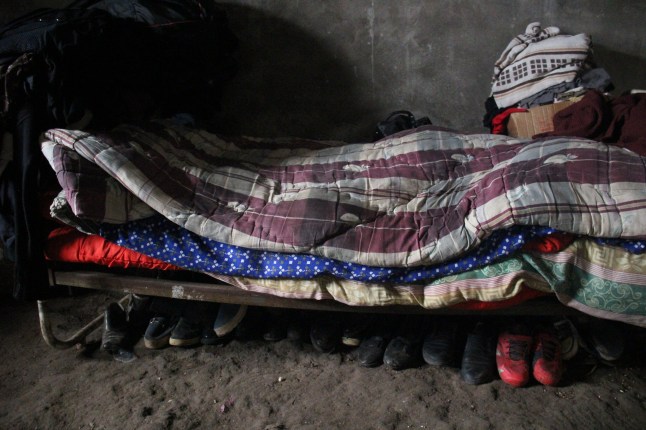
The living room of the Gamkhitashvilis, who have lived in their home near the border with South Ossetia for more than 50 years (Picture: Marium Urushadze)
It is only a month after Metro travelled to the border that a friend of Katsarava’s, Tamaz Ginturi, a veteran of the five-day war in 2008, is shot to death by Russian border guards near the village of Kirbali.
Another Georgian man is also kidnapped near the village of Sinaguri, but his fate remains unclear.
According to Katsarava’s anti-occupation movement ‘Strength in Unity,’ at least 1,400 people have been taken since the 2008 war, but Metro could not confirm this number.
‘This is terror,’ he says, despite some geopolitical experts describing the conflict between Georgia and the Russia-controlled South Ossetia as ‘frozen’.
‘Soldiers want to show who the bosses are and frighten people. Russia wants this region to be depopulated, so it is much easier for them to continue their creeping occupation.
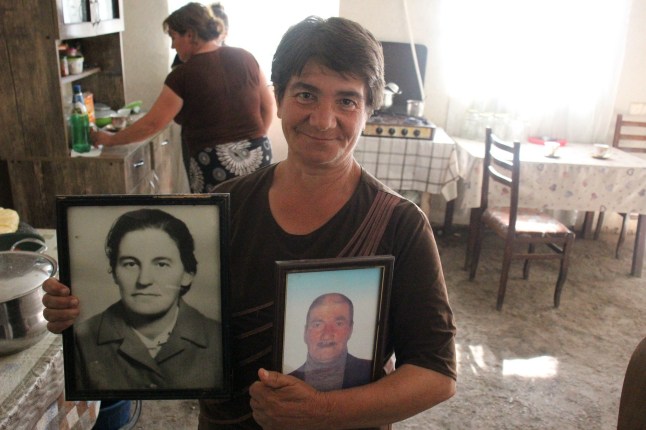
Lia Gamkhitashvilis showing old photographs of her parents (Picture: Marium Urushadze)
‘When the villages are empty, they can push the fencing further.
‘People who are kidnapped are brought to the court in Tskhinvali [capital of the breakaway region of South Ossetia].
‘Sometimes they are sentenced to jail. Sometimes they are asked to pay a penalty of ₾800. The more people they [Russians] kidnap, the more money they get paid.
‘Some are forced to sign a document agreeing that they have illegally crossed the borders of the republic and that they recognise it as an independent country.’
Russia’s creeping borderisation
The length of the occupation line extends to 260 miles, but fences were erected on just 44 miles. In some places, it is marked by signs or posts, but in others, it is a dangerous guessing game.
This makes it difficult for people to know on which side of the border they are at times.
Katsarava argues that many villagers mistakenly think that ‘more fencing equals more protection from soldiers’.
‘Any metre of fence installation is aggression to us,’ he tells Metro as we walk to the next house in Kirbali.
‘What they do not realise is that most kidnappings happen when Russian troops cross into Georgian-controlled territory, not the other way around.’
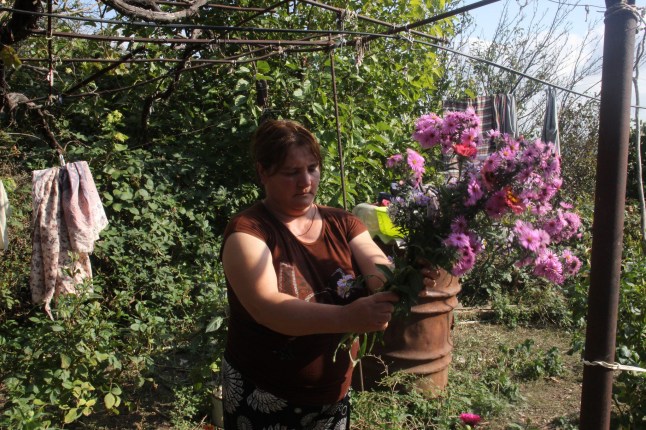
Dali Gamkhitashvilis picking fresh flowers from their garden (Picture: Marium Urushadze)
Humanitarian catastrophe for Georgians
From far away, the place looks less like a house and more like a makeshift shelter in a mountain.
Up close, it is barely more than a haphazard assembly of rough-chopped wooden logs stacked together, leaving cracks for the wind to slip through.
It belongs to Iura Kvinkadze, a refugee from Abkhazia, who fled his homeland 30 years ago after the Russian-backed war of 1992–1993 between Abkhazia and Georgia.
Only a year after the collapse of the Soviet Union in 1991, when Abkhazia sought independence from the newly independent Georgian state, a conflict erupted as the Georgian government sent soldiers into the territory to suppress separatist movements.
Fighting was marked by severe ethnic violence, with Abkhaz separatists, bolstered by Russia, expelling as many as 300,000 ethnic Georgians.
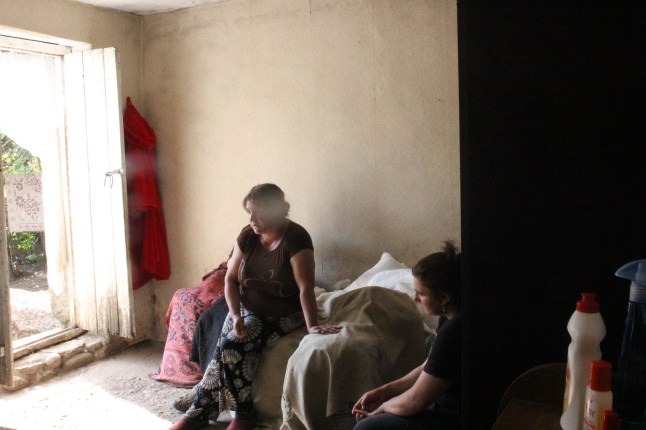
Dali and Lali Gamkhitashvilis open up about the struggles in their life (Picture: Marium Urushadze)
Katsarava says about the fate or hundreds of thousands of Georgians in Abkhazia: ‘Russia carried out a genocide on Georgians there and you cannot imagine what they did to them. It is horrible even to imagine.’
Like Kvinikadze, many abandoned their homes and communities, which were later resettled by Abkhaz, Russians, and other groups.
He tells Metro: ‘I had a large property in the city of Ochamchira, on the Black Sea coast. I lived there well and was self-sufficient.
‘Russian forces pushed me to leave in 1993. I have a son in Abkhazia, but I have no contact with him.‘
Kvinikadze has lived in the wooden hut for some 30 years, with more than half of his life marked by displacement.
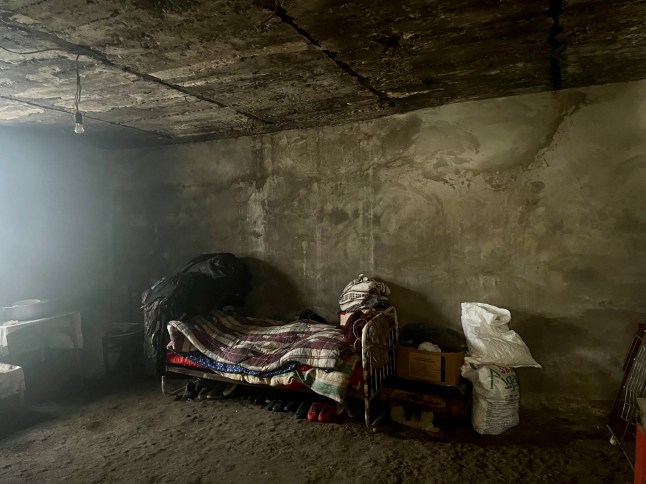
One room in the home of the Gamkhitashvilis (Picture: Marium Urushadze)
As a refugee, he receives ₾30 from the Georgian government, which amounts to less than £9. Neighbours help him with food and Katsarava and his team have been bringing him produce in the last three months.
With the conflict between Abkhazia and Georgia remaining unresolved and Russia threatening to formally annex the territory – like Ukraine’s Crimean peninsula – for many refugees, like Kvinikadze, the prospect of returning ‘home’ remains elusive.
Our next stop is the home of the Gamkhitashvilis, three sisters Lia, Lali and Dali, and their brother David (Dato), which was pieced together by their parents more than 50 years ago.
The harshness of nature is kept at bay by layers of thick nylon, stapled over and over to the window frames.
There is no glass to block the cold, just the thin barrier that rustles with the wind.
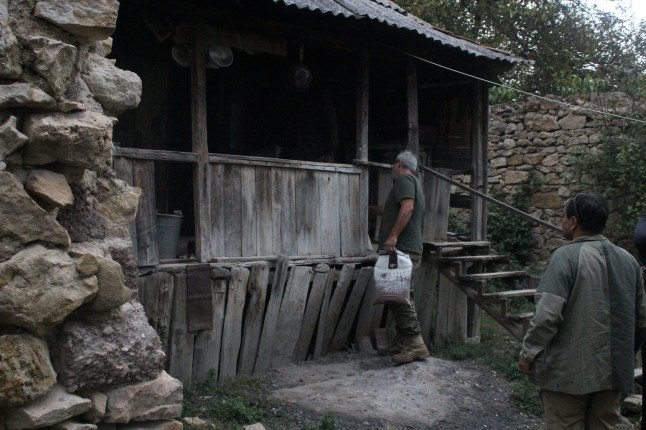
Kvinikadze has lived in this wooden house all alone for decades (Picture: Marium Urushadze)
Poisonous snakes would also chew through the plastic and enter the home, hiding under their bedding.
The walls are bare, lacking any insulation, and underfoot, the floor is little more than aging concrete, pitted and worn down.
‘We live in horrid conditions. We feel so isolated,’ Dali, one of the sisters, says.
The family-owned cows and sheep, but had to sell all of them, one by one, over time as whatever work there was in the region disappeared, after scores of people left for the big cities.
Dali adds: ‘It was like selling my children.’ In total, the three sisters and brother, who are all in their 50s, receive ₾600 from the government. There is no other help and they all feel ‘abandoned’.
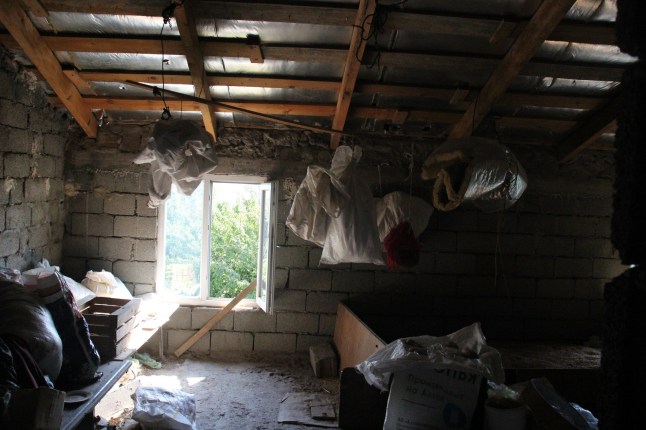
The three sisters look after their disabled brother, Dato Gamkhitashvilis (Picture: Marium Urushadze)
Dato, their brother, had a job, but has been bed-bound in the last five years after a stroke. His sisters look after him, day and night, and also work in their garden on their corn crops.
Despite living a few hundred metres from the border with South Ossetia, it is not the presence of Russian soldiers that keep them awake at night, but the daily fight for survival – what food they will put on the table and the health of their brother.
One of the sisters tells Metro: ‘The border is not that close to us to be frightened, as it is on the other side of the woodland. I remember during the war that soldiers would come here and that was scary.’
She adds: ‘We are being taken for a joke by our government. Our brother calls us sisters and mothers at the same time.’
As we depart, the sisters cut some purple, yellow and white wildflowers from their garden and present us with a bunch each, enforcing the old expression that it is often those with the least who are the most generous.
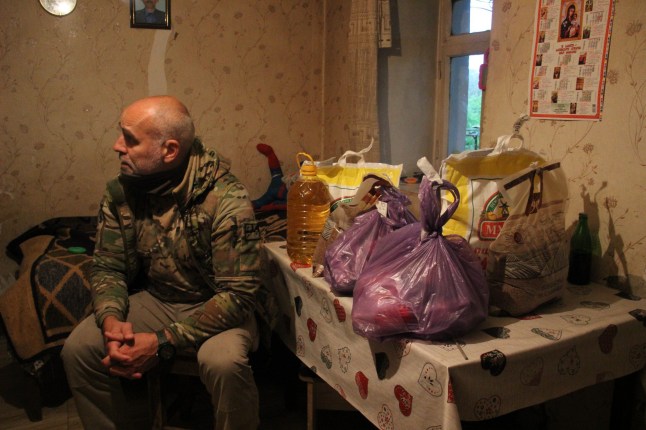
Dozens of families are dependent on Katsarava’s organisation to survive (Picture: Marium Urushadze)
For the rest of the drive back to Tbilisi, the car smells earthy and sweet from the bouquets.
Russia’s plan to ‘depopulate’ the region
Katsarava and his team help between 110 and 120 families in the region, bringing them provisions. Lifeline.ge is the only active organisation helping people there.
He says that a large portion of the population has also lost farmland because of the creeping borderisation.
Like Ukraine, Georgia is a former Soviet state bordering Russia and the Black Sea.
Katsarava, who fought on the side of Ukrainian forces in Bucha and Hostomel in Ukraine in 2022 as part of the Georgian National Legion, has been a witness to Russia’s imperialism.
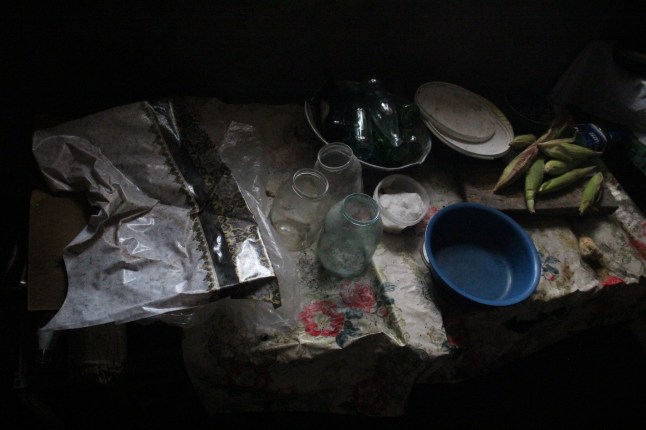
Most families live off from what they can grow in their gardens – potatoes, corn, peppers and tomatoes (Picture: Marium Urushadze)
His theory is that if Vladimir Putin loses his war in Ukraine, he will then order the annexation of the occupied territories in Georgia as he will need a ‘victory’ to demonstrate his reach.
‘This could lead to the invasion of all of Georgia. Russia’s image as a superpower is crumbling,’ he says.
Katsarava wears grey cargo pants, camo T-Shirt and army boots. An embroidered patch on his jacket reads ‘Strength in unity and unity in Georgia’.
Moments away from capture in the ‘zone of fear’
It was just 12 hours ago that he was moments away from being captured by the Russian forces while carrying out a reconnaissance mission on the border.
‘We went to the zone of fear. Police do not even go there,’ he says. ‘We wanted to install a hidden camera to show how Russian soldiers cross the border at night and move the barbed fence.
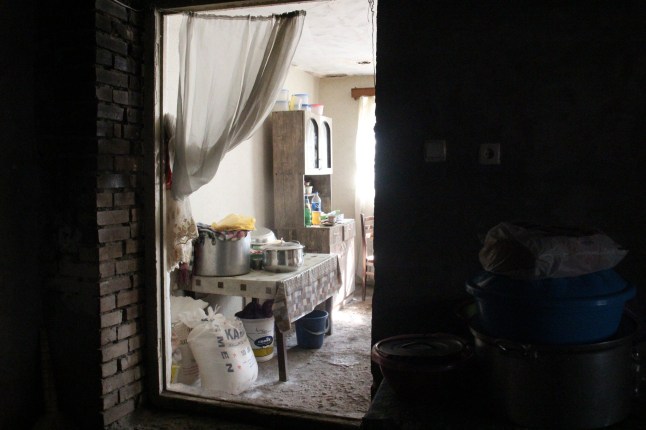
Most residents in the villages near the border say they feel ‘abandoned’ by the Georgia government (Picture: Marium Urushadze)
‘This was our mission. It was five of us. We were very quiet. We would move 100 steps and stop and listen, then again. We heard Russian voices and understood that it was becoming a dangerous situation for us.
‘We were lucky and managed to go back, sadly without fulfilling our mission, but at least we are alive.’
This apparently happens often, so Katsarava does not seem shaken up by it.
In his previous life, as he refers to it, he was the president of the rafting federation in the country and an actor – Georgia’s Liam Neeson in a way.
‘I used to act in movies, but now my life is a movie,’ he says.
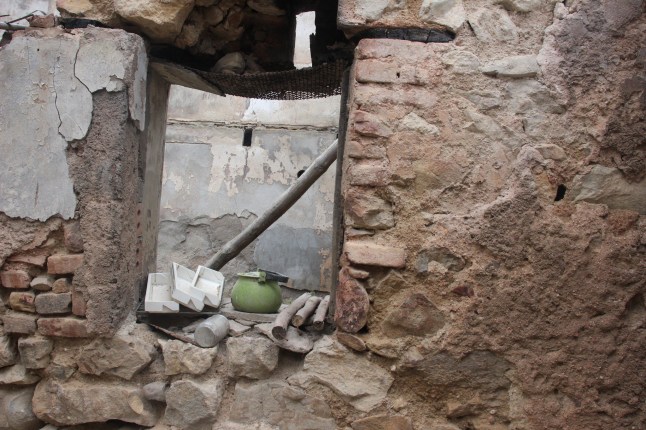
The remnants of a home burnt down by Russian guards (Picture: Marium Urushadze)
This is all confirmed when the taxi driver who dropped me off outside a Wendy’s on the outskirts of Tbilisi, where I met him and his team in the morning, asks for a selfie with him before departing.
‘I was a popular actor in Georgia, so I did not have enemies back then,’ he says all of a sudden. From his laughter, I sense he has enemies now.
He continues: ‘I lived a public life, I was not involved in politics. Then, I changed my life and started this monitoring mission.
‘It all started on April 9, 1989, when Georgia was part of the Soviet Union, and an anti-Soviet, pro-independence demonstration was crushed by the Soviet Army.
‘Soldiers killed peaceful protesters. I was just 11 but I remember the morning of the demonstration and how scared everyone was.’
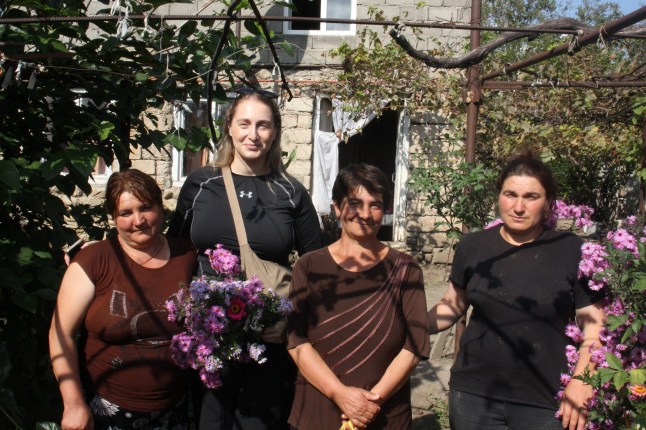
Metro foreign news reporter Gergana Krasteva with sisters, Dali, Lia and Lali (Picture: Marium Urushadze)
‘Then, when the war in South Ossetia and Abkhazia was taking place, I was just 14 or 15, so I could not participate. Then in 2008, I volunteered during the Russian invasion of Georgia, but the war was over in just five days.
‘And in the beginning of July, 2017, I read in the news that Russian forces had started to move the barbed wire on the border with South Ossetia.
‘The pain – stored up throughout all these years – prompted me to launch this monitoring mission.’
Responsibility for the war in both South Ossetia and Abkhazia is still disputed. An EU-backed report concluded in 2009 that it was started by Georgia’s armed forces but that Russia’s response went beyond reasonable limits, violating international law.
Katsarava says many people who knew him from television and films were cynical at first, suspecting he was attempting to launch his political career. They also saw him as a ‘provocateur’.
Despite intimidation and threats from Russian forces, his team continues the work on the border, observing soldiers creeping out after dark to move the unofficial line – usually only a few metres into Georgia, sometimes a mile.
Get in touch with our news team by emailing us at [email protected].
For more stories like this, check our news page.
Arrow
MORE: Russia spokeswoman gets call telling her to ‘shut up’ during live TV briefing
Arrow
MORE: Astonishing moment Putin’s hypersonic missile pierces through the sky during Ukraine onslaught
Arrow
MORE: Step-by-step guide to surviving a nuclear attack and what happens after
News Updates
Stay up to date with the stories everybody’s talking about.
Source link : http://www.bing.com/news/apiclick.aspx?ref=FexRss&aid=&tid=674027bc1c54481f952787093e1aec5e&url=https%3A%2F%2Fmetro.co.uk%2F2024%2F11%2F22%2Finside-europes-zone-fear-people-face-kidnap-death-without-warning-21860106%2F&c=6212645901106720448&mkt=de-de
Author :
Publish date : 2024-11-21 22:00:00
Copyright for syndicated content belongs to the linked Source.

